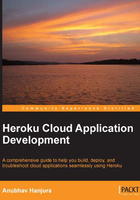
Introducing Heroku
Heroku (http://www.heroku.com), pronounced her-oh-koo, is one of the leading PaaS providers in the cloud software business, proving itself to be the leading PaaS solution for small and big enterprises alike. With consistent improvement and the philosophy of "convenience" over "configuration", Heroku has become the leading cloud app development platform for developers, having been used by over 40,000 websites till date. The Heroku philosophy is to let developers focus solely on writing web applications and forget about servers. Heroku magically takes care of building, deploying, running, and scaling the application for the developer on demand.

Heroku is a polyglot cloud application platform that provides tremendous flexibility in choosing an appropriate programming language to develop web apps. Heroku provides platform support for Ruby, Ruby on Rails, Java, Node.js, Clojure, Scala, Python, and PHP as of early 2013.
Heroku's add-on architecture allows the developers to customize the use of various third-party packages based on the need. You have the flexibility to choose a basic or a premium plan based on the requirement of your website. The developer can supercharge the apps with add-on resources, such as Memcached for caching data or a NoSQL database and create really powerful, feature-rich web apps.
Heroku provides a lot of flexibility in managing your app once you have deployed it. With Heroku, a developer can manage the app using the Heroku command-line tool running on the client machine or the dashboard running on the Heroku infrastructure.
Heroku is highly scalable. It scales transparently as your traffic spikes and it can serve applications with over 103 sustained requests per second today.
Heroku Git's focused workflow makes it easy to share code, collaborate with other developers, and deploy code frequently, thereby cutting down on the time it takes the app to reach its users.